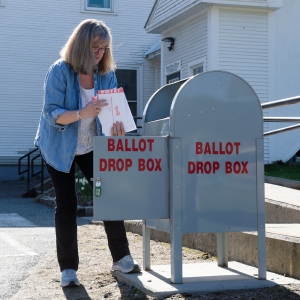Legislature passes bottle bill update, but Gov. Phil Scott opposes it. What’s next?
| Published: 06-25-2023 10:24 PM |
Lawmakers in the Vermont House passed an updated version of the bottle bill Tuesday during a summer session otherwise generally reserved for taking action on bills Gov. Phil Scott had already vetoed.
The bottle bill, H.158, was an exception: It had not cleared the Legislature during the regular session and so had not reached Scott’s desk. House members approved the bill on a voice vote Tuesday afternoon, meaning it will head to the governor soon.
But Scott opposes the bill, his press secretary, Jason Maulucci, said Tuesday. If the governor vetoes it, the bill’s only path forward would come when the Legislature reconvenes — either next January or potentially this fall, when the House and Senate are expected to return for impeachment proceedings.
The existing bottle law, last updated in 1972, is responsible for the 5-cent or 15-cent deposit added to some types of beverage containers. Those can be redeemed if consumers bring the bottles back to redemption centers, where they’re recycled.
Deposits that aren’t claimed have gone to the state’s Clean Water Fund, which funnels money toward efforts such as reducing water pollution and removing old dams.
Environmentalists and lawmakers have argued that the bottle bill needs to be updated to keep pace with the development and sale of new beverages. The state’s current bottle law covers beer, wine coolers, malt beverages, pre-mixed cocktails and carbonated non-alcoholic drinks, along with liquor and spirits, whose deposits are 15 cents.
H.158 would cover “all drinks in liquid form and intended for human consumption, except for milk, dairy products, plant-based beverages, infant formula, meal replacement drinks, or nonalcoholic cider,” the bill states. It would include water bottles and energy drinks, for example.
The updated bill would assign a 15-cent deposit to wine bottles and other vinous beverages. Liquor bottles greater than 50 milliliters would keep their existing 15-cent deposits.
Article continues after...
Yesterday's Most Read Articles
 Dartmouth administration faces fierce criticism over protest arrests
Dartmouth administration faces fierce criticism over protest arrests
 Three vie for two Hanover Selectboard seats
Three vie for two Hanover Selectboard seats
 A Look Back: Upper Valley dining scene changes with the times
A Look Back: Upper Valley dining scene changes with the times
 Norwich author and educator sees schools as a reflection of communities
Norwich author and educator sees schools as a reflection of communities
A separate part of the existing law requires beverage container manufacturers to reimburse people who operate redemption centers and handle the returned containers. The updated bill increases the reimbursement amount for containers that need to be sorted from 4 cents to 5 cents per container, an effort to help struggling redemption centers.
The bill would require manufacturers to participate in producer responsibility organizations that ensure consumers have “convenient opportunities to redeem beverage containers.”
Rep. Kristi Morris, D-Springfield, who spoke about the bill on the House floor Tuesday, said the bill would “increase clean materials into the redemption program” and “keep more containers out of our landfills and off our roadsides.”
Others have expressed concerns that expanding the beverage redemption program will interfere and hurt the existing recycling system, which generally works well in Vermont.
Rep. Pattie McCoy, R-Poultney, said the program could increase the cost of recycling while increasing the amount of recycling by only a small amount.
She called the bill “a solution in need of a problem.”
“Material recycling facilities use the same markets for materials as the bottle bill,” she said. “Glass from Rutland is recycled into bottles or fiberglass. Plastic bottles are recycled into bottles or other products. Recycling facilities are already processing materials that do not get redeemed, which decreases the cost to Vermonters to get rid of their trash.”
The governor believes that expanding the bottle deposit system is “the wrong approach,” Maulucci said on Tuesday.
“He also has concerns about the capacity of deposit centers to handle the increased volume, and the potential cost implications for Vermonters,” he said.
According to the Vermont Public Interest Research Group, which backs the bill, many states have updated their bottle laws to reflect changing beverage markets.
“Over 80% of Vermonters support the bottle bill and this expansion of it, and already participate actively in it,” Rep. Amy Sheldon, D-Middlebury, who chairs the House Environment and Energy Committee, told lawmakers on the House floor on Tuesday.

 Students take down pro-Palestinian encampment at UVM
Students take down pro-Palestinian encampment at UVM Sharon voters turn back proposal to renovate school
Sharon voters turn back proposal to renovate school
